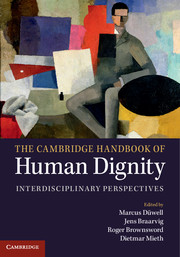Book contents
- Frontmatter
- Contents
- List of contributors
- Foreword
- Why a handbook on human dignity?
- Acknowledgments
- 1 Human dignity from a legal perspective
- 2 Human dignity: concepts, discussions, philosophical perspectives
- Part I Origins of the concept in European history
- Part II Beyond the scope of the European tradition
- Part III Systematic conceptualization
- Part IV Legal implementation
- 36 Equal dignity in international human rights
- 37 Is human dignity a useless concept? Legal perspectives
- 38 Human dignity in French law
- 39 Human dignity in German law
- 40 Human dignity in US law
- 41 Human dignity in South American law
- 42 Human dignity in South African law
- 43 The Islamic world and the alternative declarations of human rights
- 44 The protection of human dignity under Chinese law
- 45 Human dignity in Japanese law
- 46 The place of dignity in the Indian Constitution
- Part V Conflicts and violence
- Part VI Contexts of justice
- Part VII Biology and bioethics
- Appendix 1 Further reading
- Appendix 2 Universal Declaration of Human Rights
- Index
- References
46 - The place of dignity in the Indian Constitution
from Part IV - Legal implementation
Published online by Cambridge University Press: 05 March 2015
- Frontmatter
- Contents
- List of contributors
- Foreword
- Why a handbook on human dignity?
- Acknowledgments
- 1 Human dignity from a legal perspective
- 2 Human dignity: concepts, discussions, philosophical perspectives
- Part I Origins of the concept in European history
- Part II Beyond the scope of the European tradition
- Part III Systematic conceptualization
- Part IV Legal implementation
- 36 Equal dignity in international human rights
- 37 Is human dignity a useless concept? Legal perspectives
- 38 Human dignity in French law
- 39 Human dignity in German law
- 40 Human dignity in US law
- 41 Human dignity in South American law
- 42 Human dignity in South African law
- 43 The Islamic world and the alternative declarations of human rights
- 44 The protection of human dignity under Chinese law
- 45 Human dignity in Japanese law
- 46 The place of dignity in the Indian Constitution
- Part V Conflicts and violence
- Part VI Contexts of justice
- Part VII Biology and bioethics
- Appendix 1 Further reading
- Appendix 2 Universal Declaration of Human Rights
- Index
- References
Summary
While the makers of the Indian Constitution rather acutely anticipated the notion of ‘human dignity as empowerment’ (Beyleveld and Brownsword 2001), it is no simple task to understand the precise place of human dignity within the constitutional scheme. Moreover, for a variety of reasons, grasping the ways in which dignity as empowerment has been put to work in the sixty-plus years of the Indian Constitution remains an even more hazardous narrative.
First, India's sixty-year-long freedom struggle was premised on the idea that sustained colonial predation and subjugation constituted an epic saga of humiliation – the Other of dignity. This Indian struggle for freedom, together with the Constitution that it eventually produced, offers a becoming and befitting response to the contemporary and ahistoric ‘digcrits’ discourse (questioning the conceptual and normative coherence of human dignity as well as its institutional viability).
Second, the freedom movement also generates a new telos of dignity for the subjects of violent social exclusion constituted by the discursive formations of the Hindu Dharma that disacknowledged moral capacity and legal subjectivity to India’s millennially humiliated peoples – the Untouchables, the indigenous peoples, and in a related yet distinct sense the masses of Indian women.
- Type
- Chapter
- Information
- The Cambridge Handbook of Human DignityInterdisciplinary Perspectives, pp. 429 - 436Publisher: Cambridge University PressPrint publication year: 2014
References
- 4
- Cited by



